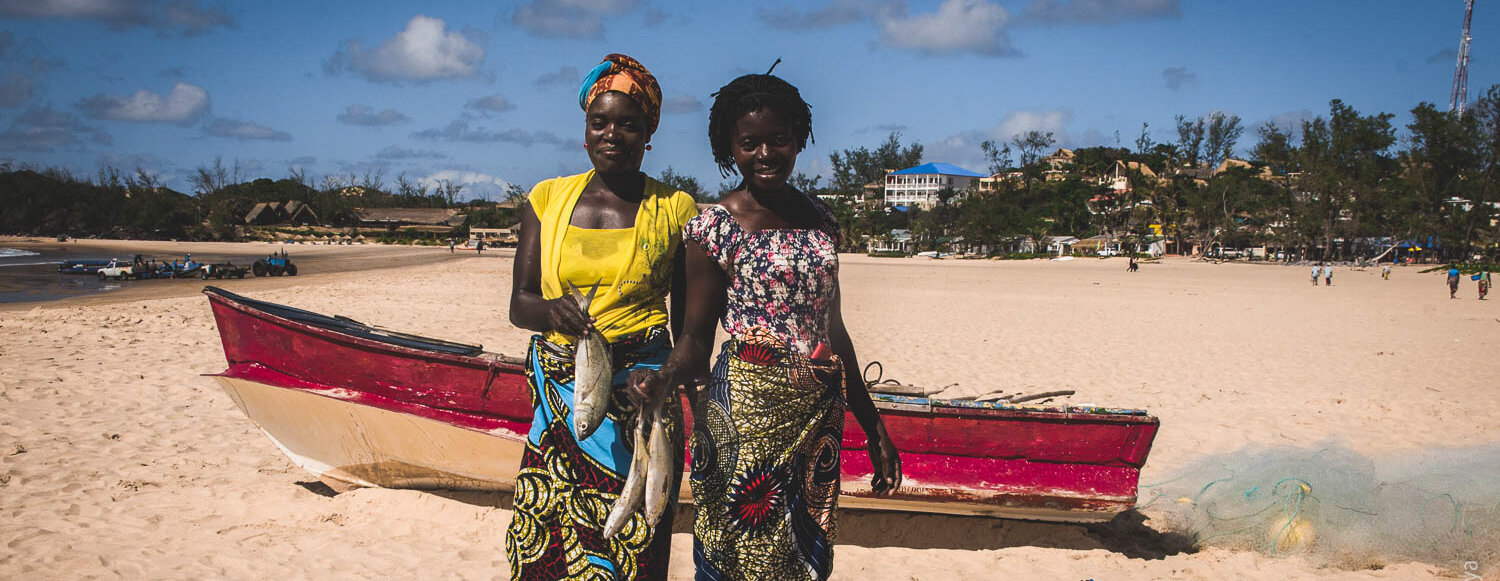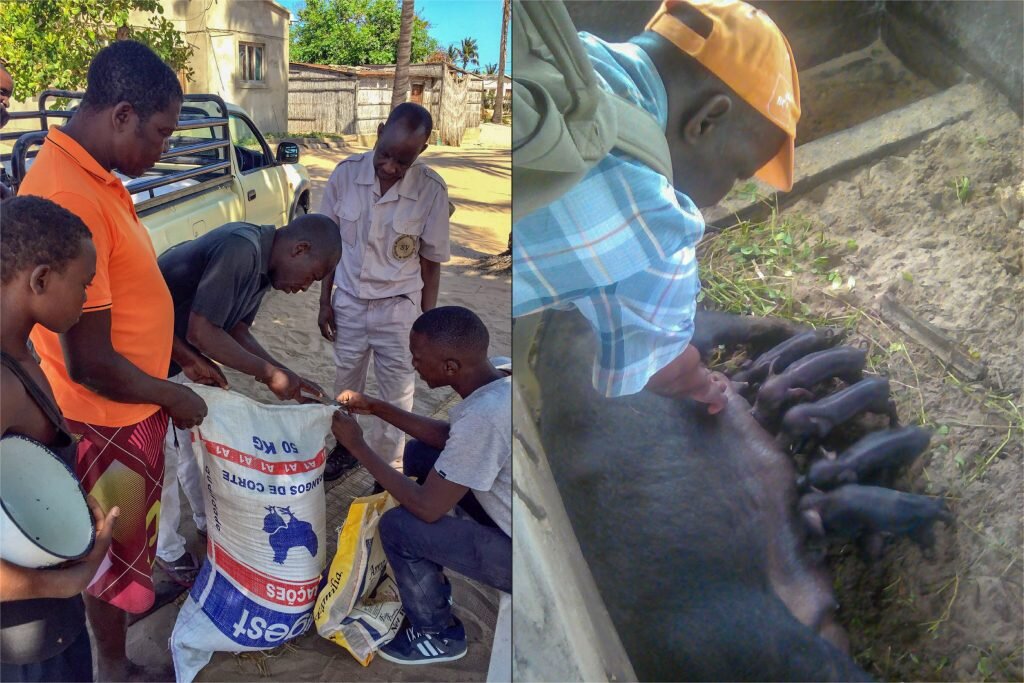
MOZAMBIQUE
SUSTAINABLE SEAS PROGRAMME
OVERVIEW
The main objective of the sustainable seas project is improved marine resource management with a visible reduction in destructive fishing practices and increased commitment to ocean conservation. The project aims to address threats to vulnerable species, reverse the impact of overfishing and help communities protect their valuable natural resources for future generations.
With the creation of an effective network of Locally Managed Marine Areas (LMMAs) along Inhambane´s coast and sustainable fishing activity throughout the most bio-diverse waters, MMF aims to mitigate threats to vulnerable species . The organisation will also help communities to protect their valuable natural resources for future generations, supported by improved scientific knowledge of keystone species and fisheries, responsible marine resource management and alternative livelihoods and a creation of a network of Ocean Ambassadors and Guardians raised to cherish their waters.
WHY MOZAMBIQUE?
Mozambique is home to one of the world’s most diverse hotspots of marine life. As a developing country with a rapidly growing population, Mozambique is also especially vulnerable to unsustainable fishing and climate change pressure. It is for these reasons that Mozambique presents a rare opportunity to make a significant, positive impact on the future of our ocean.
THREATS AND CHALLENGES
Declining vulnerable marine megafauna populations and biodiversity degradation
Unsustainable artisanal fishing, declining fish populations and growing hunger
Under-resourced marine conservation and fisheries governance
Low levels of community awareness of marine conservation or pride in the ocean
A lack of baseline data on marine biodiversity and critical keystone species
OUR SOLUTION
INFORM, INFLUENCE AND EMPOWER MOZAMBICANS TO PROTECT THEIR OCEAN
We need to scale up our efforts and build on our initial successes.We want to deepen our research into why marine megafauna are in rapid decline, continue to raise the Ocean Ambassadors and Guardians of the future and increase the reach of our conservation efforts along the coastline.
> Creation of Marine Protected Areas Managed by the community
The ultimate goal is to have a well-managed marine corridor where unsustainable fishing practices have been eradicated and certain areas are closed to fishing. In order to assure sustainability and long-term effectiveness, those areas will be managed by the community
> Raising Ocean Ambassadors and Guardians, who cherish the ocean
The Ocean Ambassadors and Guardians will be raised through education and empowerment of local leaders, fisherman, children and youth from the fishing communities and pride in the ocean will flourish. Engagement in social mobilization and awareness raising will be instrumental in building pressure for change in behavior and practices at the local and provincial level.
> Reduction in destructive and indiscriminate artisanal fishing methods
Through the introduction of alternative livelihoods, supplementary incomes and savings schemes, target fisher households will directly benefit from diversified, and therefore improved, income, and some will also benefit from increased wealth. Through conservation and better management of marine resources, especially megafauna, all coastal communities in the project areas will indirectly benefit from sustained income from fishing and tourism businesses.
This initiative brings research, education and conservation together to effect change in attitudes, behavior and policy in order to improve management of marine resources at the local and national level. MMF will partner with WCS to provide a critical link between local interventions and national discussions around LMMA establishment, monitoring, enforcement and sustainability. In order to start improving marine resource management and conservation we will start educating and empowering leaders and communities to inspire transformational change. Women and girls comprise over 50% of the population and empowering them to take part in decision making and education activities has been proven to increase chances of success and sustainability. This project will facilitate the meaningful participation of women in decision making forums and will support them in diversifying household incomes.
Communities are requesting greater government engagement in their local efforts, and MMF will work to facilitate improved coordination with local authorities, with a focus on monitoring and enforcement of LMMAs. By establishing strong, successful community-led conservation models it will become increasingly easy to expand to new communities and to engage with authorities and stakeholders at the national level. To ensure buy-in, our activities will identify the different interests and priorities of each stakeholder. We will explore ways to establish immediate benefits for fishers to support their engagement in longer-term resource management. By focussing on the important economic benefit that manta ray and whale shark tourism brings to the region, we will inspire tourism businesses and government stakeholders to invest in conservation outcomes.
The Ocean Ambassadors’ engagement in social mobilisation and awareness raising will be instrumental in building pressure for change in behavior and practices at the local and provincial level. By expanding into new communities and establishing opportunities for exchanging ideas and best practice, we will establish a network of LMMAs and Ocean Ambassadors up and down the coast of Inhambane. The ultimate goal is to have a well-managed marine corridor where unsustainable fishing practices have been eradicated and certain areas are closed to fishing.
INTERVENTION AREA
We have identified the most critical areas along the Inhambane coast that are in need of support to reach a sustainable resource management strategy. Together with partners in the field, we aim to complement existing initiatives and leverage our partners' expertise.
We aim to consolidate our activities in Tofo and expand to the nearby communities, Praia da Rocha e Praia da Barra, who have invited us to act due to the increasing disquiet of biodiversity deterioration. Those communities have identified the use of gill nets, which are also used in critical breeding areas, and the lack of enforcement were of general concern.
In Pomene and Morrungulo, the communities state illegal fishing and constant bycatch occur while the pressure on fish stocks increases. They feel this is a direct threat to their food security.
Finally, Bazaruto Archipelago is a protected area in which, although the enforcement does exist, there is the need for community engagement and deeper understanding on why marine conservation is relevant for them and the surrounding habits.
Special thanks to our Sustainable Seas project funders, Prince Albert II of Monaco Foundation, Fondation Ensemble and Turing Foundation.




